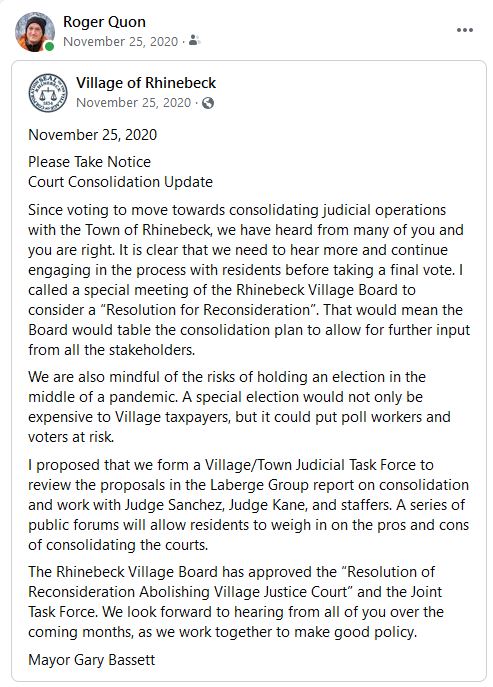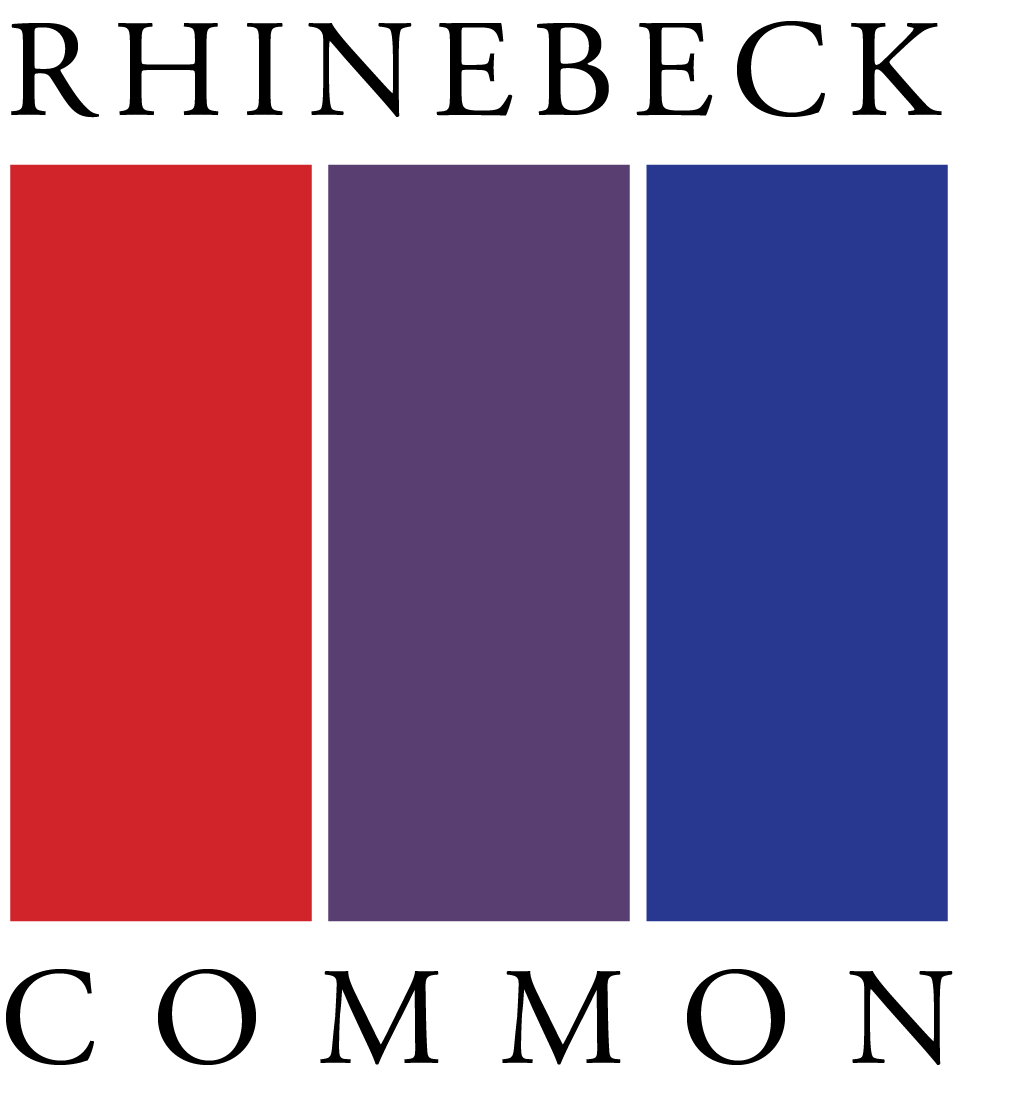Voices Lost, Voices Regained
It Takes a Village…
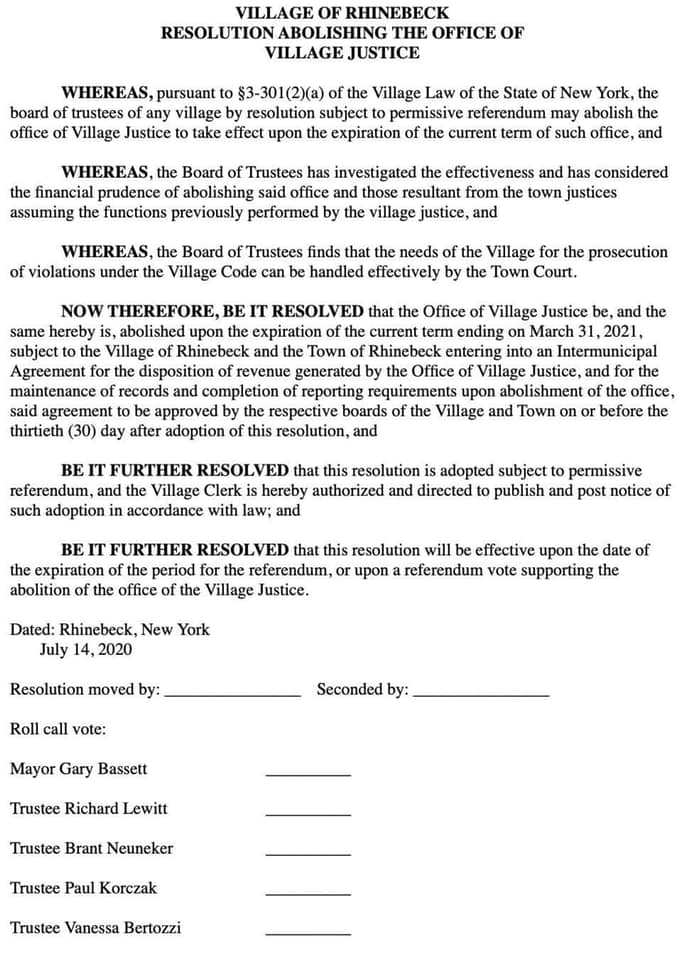
On a sunny Friday, September 18th, 2020, the Village pushed out a notice stating that the Board would consider abolishing the Village Court on the following Monday, September 21st, 2020.
Accompanying this announcement was a report from a study group led by Town Supervisor Elizabeth Spinzia and Village Mayor Gary Bassett recommending the dissolution of the Village Court, and transference of all court matters to the Town. This change would have become effective March 21st, 2021… at the end of Judge Sanchez’s current term. Notably, the report called out Judge Sanchez as an unwilling participant in this study group.
One resident noticed this announcement and asked if anyone knew what it was about on a popular, local Facebook page. Shockingly, almost no one knew much of anything… including a Trustee!
Questions Begged…
How is it that Trustees, let alone residents, were not aware of this report or resolution? Who knew what and when?
Why were no public hearings on this matter scheduled? Why the rush?
Why was this resolution dated July when Trustees Neuneker and Bertozzi were not even formally elected?
Why did Judge William Sanchez not participate in this study group?
Voices Lost
Curious and concerned residents, including Roger Quon, wanted to ask these and other questions to our Village Board directly, but were denied. The Board meetings could only be attended by those invited by the Board. Mayor Gary Bassett and Trustee Ric Lewit said public comment could be submitted by e-mail, or by the chat feature in the Facebook stream.
Undaunted, Roger Quon hastily composed a letter to the Board on the picnic bench outside the Village Hall thinking it would be read and considered. He was wrong. His letter, and many others, were not read nor even acknowledged by the Board. The live stream was ignored except by Trustee Neuneker.
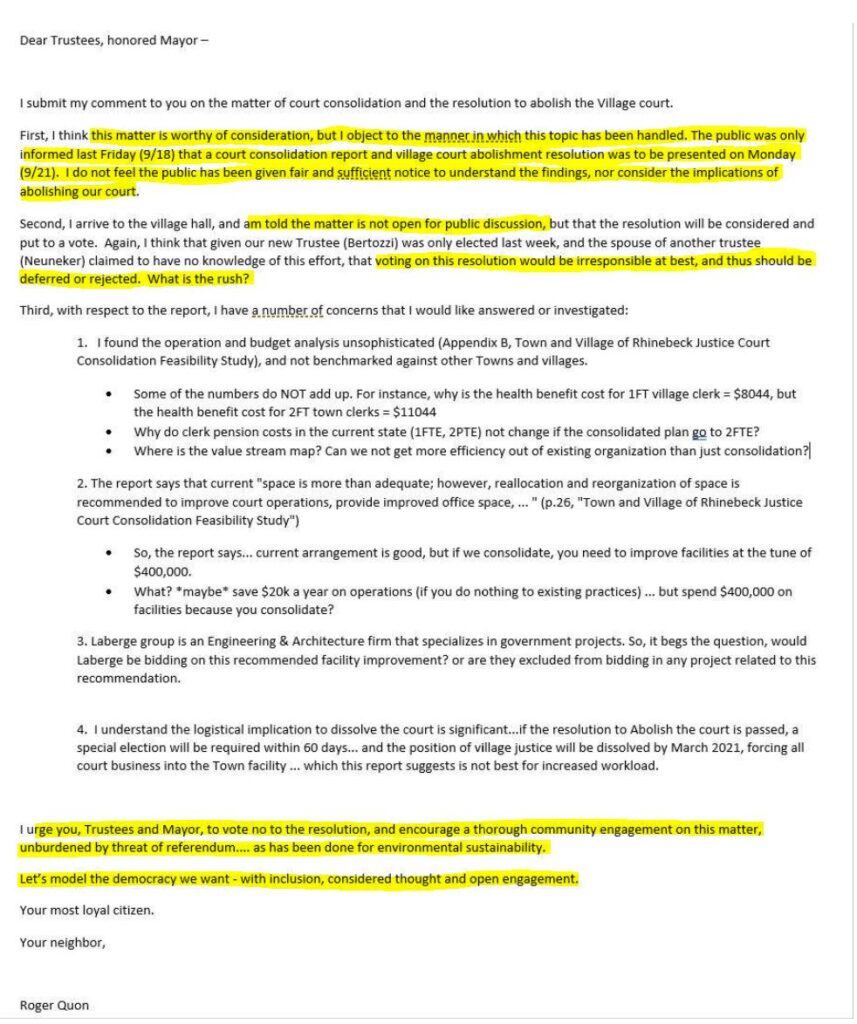
The Board did invite and allow Elizabeth Spinzia and Judge John Kane to speak on the matter, and both of them endorsed the recommendation. Curiously, Judge William Sanchez, the current occupant of the affected position, was not invited to comment or speak. After some discussion, and acknowledgement that the resolution was subject to permissive referendum, the Board decided by a 4-to-1 vote to abolish the Village Court (AYE: Bassett, Lewit, Korczak, Bertozzi ; NAY: Neuneker)
We believe our governing leaders should have the wisdom to engage the community broadly when a significant change to our political structure is involved, especially one affecting an elected position. Unfortunately, the Board chose to limit discussion and isolate dissent.
It Takes a Village
The only recourse left to residents to have questions heard and answered was to petition against the resolution. Forcing a referendum required collecting signatures from 20% of registered voters in only 30days.
John Rossi, Roger Quon and William Sanchez found common cause in the need to defend the people’s voice on this matter, and worked together to make this happen, in a pandemic. Over 30 other villagers joined the call-to-action.

Mayor Sipperley did not feel this way, and had to correct the record.
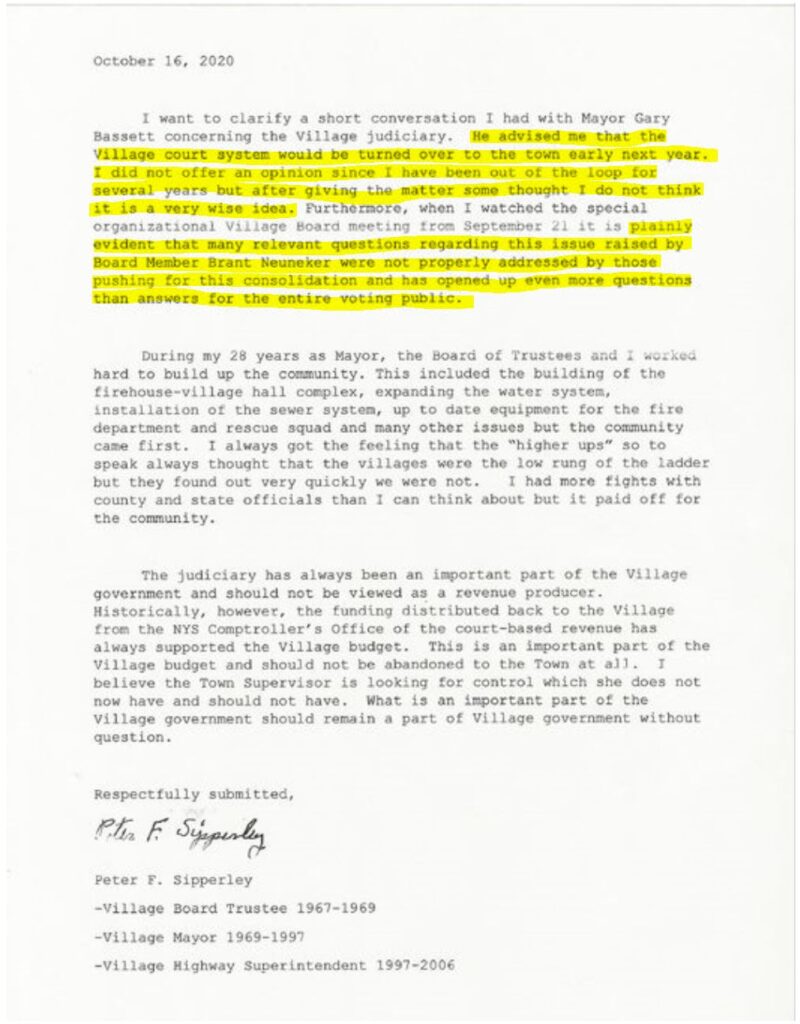
Troubled by this discrepancy of account, the interest to collect signatures for the petition against the resolution gathered momentum. The petition team also submitted FoIL (Freedom of Information Law) requests for all information (minutes, correspondence) related to the Court Consolidation Study Group. To this date, the Village has not responded to this FoiL request.
On October 19th, 2020, a petition by 650+ villagers, from across the political spectrum, was submitted requesting a referendum on the resolution was submitted to the Village Clerk.
Also, on October 19th, the Village found a way to host a forum that allowed village residents to speak directly to their elected representatives.
Voices Regained
The Village voters finally had a chance to hear from the elected officials on the matter.
The officials asserted that abolishing the Village Court and consolidating Justice activity in the town would bring
- Financial Savings
- Service Benefit
- Facility Enhancements (to the Town)
The substance behind these assertions seemed marginal, exaggerated or false by our eye.
- Potential savings in an optimistic model amounted to less than 1% per typical household, which is the difference between cost of operation and typical fees recovered from the State for fines. The cost of operating the court absent of fees is 3% of the Village budget; for context, the highway department is roughly 30% of the Village budget. The margin for error is high, and made a poor assumptions about the frequency of use of the facilities. Elizabeth Spinzia even commented in one forum that if consolidation cost more money to the Town (which also taxes Villagers), it would be worth the benefit.
- Service benefits largely focused on alleged confusion for people trying to find the right court; they are across the street from each other. No survey or data backed this assertion up, and is largely anecdotal. Operation studies and examination of how one single facility would manage double the case load was not provided.
- Facilities are adequate in both Courts now, and the Village already operates in the fashion recommended by the study. Opportunities to improve safety have been missed because the Village and Town have not applied for standing grants offered by the State to improve the safety and operation of the courts. Most notable in the report provided by Laberge (an engineering firm), is that the Town building could be enhanced to the tune of $400,000 with up to half that cost coming from each of the Village and Town through grants; note that this would mean the Village would be subsidizing the improvement of a Town facility instead of applying for the grant to update its facilities, which also needs to be ADA compliant regardless of whether we have a court or not.
The study also did not examine the BENEFIT of a Village Court, nor consider how integral it is to our Justice and Social Work matrix. In fact, we are pleased to see that the committee examining police reform cited the need to creatively examine how the Village might collaborate with social service agencies. What some may not appreciate is that Judge William Sanchez has already been a critical conduit to helping people find a better path because of his history and experience in policing, crisis management, mental health and education. Electing a good Judge, who can balance the needs of justice and compassion, is a privilege the Village enjoys and should preserve.
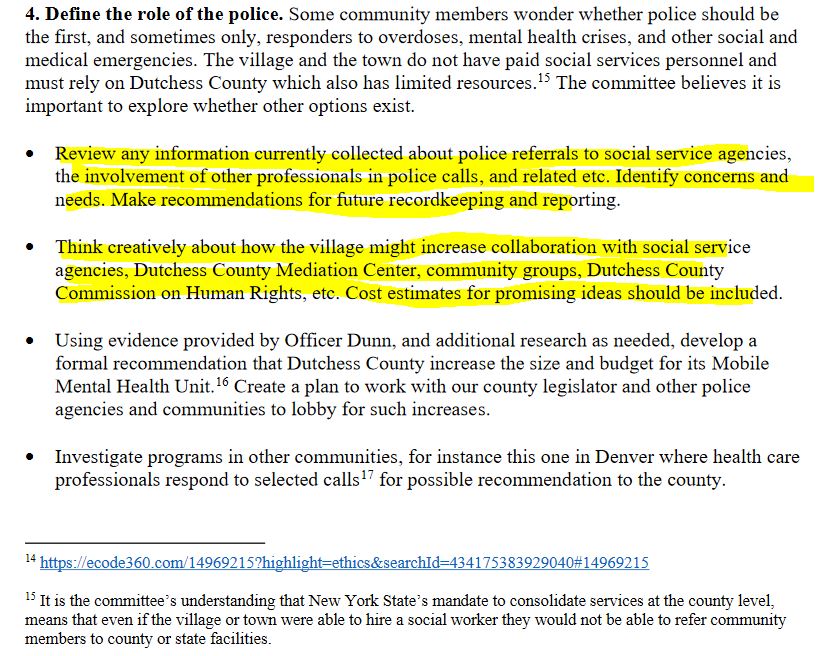
Instead of discussing these possibilities or acknowledging the matter needed more study, Town Supervisor Elizabeth Spinzia made the surprising assertion that the controversy over the court was somehow Judge Sanchez’s fault.
Rhinebeck Town Supervisor Elizabeth Spinzia … criticized Village Court Judge William Sanchez for not participating in any of the public discussions regarding personnel, or the consolidation in general because he is the one with the authority to approve it.
“What upset me most is this air of misinformation that’s out there; and again, I lay this at the feet of Judge Sanchez who will not come and discuss this with us,” said Spinzia. “He will not participate. He will not protect his employees. He is making this about him, not about what’s best for the town or the village,” she said.
The truth is that the only chance Judge Sanchez had to speak in a public forum was the September 21st meeting where the Board ultimately decided to abolish the court, and Judge Sanchez was not invited to speak. All other public forums were after the resolution was passed and the petition was submitted. Again, the petition team made FoIL requests from the Village and they have not been fulfilled. Judge Sanchez explains in our candidate forum (1:02:00 mark) how we was constrained by judicial ethics from participating in the study group on many levels, but namely because it was behind closed doors
Perhaps if the Village Board had held pubic hearings BEFORE passing a resolution to abolish the court, there would not have been so much time consumed by the community and the respective boards.
With the petition submitted, we awaited to hear if there would be any objections.
The Village hired outside counsel, David Sears, to assure the petition and signatures were valid. We are not sure why the Village counsel, David Olson, couldn’t help the Village Clerk in this matter, but were satisfied to know that over 640 signatures were accepted as valid. The counsel noted that the petition may be considered illegal as the voting district for each signatory was not noted on the petition, even though an address was provided.
The Village was left in suspense as a private citizen reserved the right to challenge the petition in State Supreme Court. We hoped that private citizen was not also serving as Trustee, but regardless, we were prepared to challenge any legal objection.
Ultimately, the petition was accepted and a referendum date was set for December 15th, 2020, in the height of the pandemic.
Then, finally, Mayor Bassett moved to withdraw the resolution he hastily pushed back in September, and left the court abolishment matter moot… for now.
